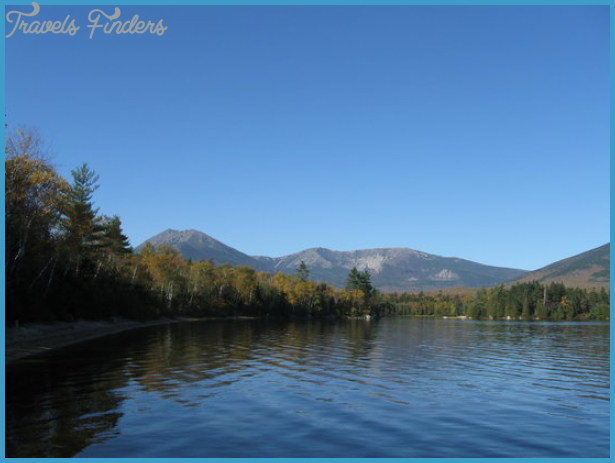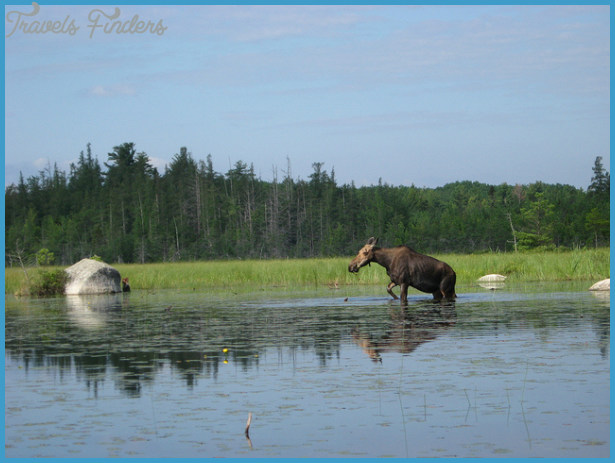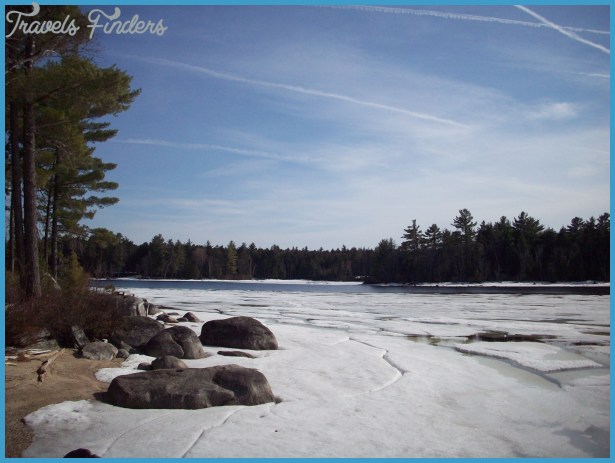Key Species: brook trout, lake trout, landlocked salmon, whitefish, white perch, pickerel, cusk
Best Way to Fish: boat, canoe
Best Time to Fish: May through September
MAG: 43, A-2 and 51, E-2
Description: This rocky, 8,960-acre coldwater lake lies within sight of Mount Katahdin, Maine’s highest mountain. Millinocket Lake is noted for landlocked salmon and lake trout fishing, but to the delight of white perch fans, it is also one of Maine’s best producers of bragging-size white perch. Local anglers often catch a winter’s supply of perch in only a few days’ time. Little opportunity for fishing from shore exists. Millinocket Lake is big and mostly open, and winds can whip the surface to a froth. On windy days, do not venture far from shore in a boat less than 16 feet long. Medway offers several campgrounds, and there are motels in Millinocket.
Fishing index: Try trolling for landlocked salmon just after ice-out, in late April or early May. Anywhere along the irregular shoreline of the lake has potential, but the stream mouths in the northwest corner and the area near the mouth of Millinocket Stream deserve special attention. Topwater action can be had through May and June. Using a 9-foot fly rod of at least 6-weight, a sinking fly line, and 20 feet of 6-pound test leader, troll with tandem streamers such as nine-three, gray ghost, red gray ghost, black ghost, supervisor, and pink lady. Joe’s smelt is effective, as are large Jerry’s smelt, Mooselook Wobblers, and Flash Kings. Local anglers often take good catches by slowly trolling with live smelt. You can use either spinning rods or fly rods to troll with live smelt, but a fly rod gives you more leverage and, in the author’s opinion, is more effective at keeping a tight connection between you and the fish, especially when the fish jumps.
At the same time of year, brook trout will be found even closer to shore, in shallow water. Drifting with small minnows, smelt, or worms will take brook trout. You can also cast toward shore with small metal spoons and spinners. By July, both brook trout and salmon will seek cooler, deeper water, but will still approach shore during the early morning and evening hours and on cool, overcast days.
You will find the deepest water and consequently the best lake trout fishing in the northwest section of the lake. Use live smelt, small suckers, or large minnows, fished near the bottom by slow trolling with a downrigger, or lead-core line and a set of lake trolls, in at least 50 feet of water. Deep trolling is best done when the water is calm, so try to get out early before the wind picks up. You can also drift over the deep areas and jig for lake trout with a large Swedish Pimple or strip of sucker belly. A fish locator will help you find where the lakers are holding. The lake trout here can weigh more than 10 pounds.
Millinocket Lake is justifiably famous for its excellent white perch fishing. Fish weighing up to 2 pounds are common. Using worms, night crawlers, small minnows, small Swedish Pimples, or lead-head, plastic-bodied jigs, try fishing in about 20 feet of water in the rocky section of the lake just off the boat ramp. You will catch plenty of perch here from June through September. Since the perch bite so well and are so large, this would be a great place to introduce children to the joys of fishing. Watch for submerged boulders in this area.
Pickerel fishing is best in the northeast section of the lake, near a large group of islands where the water is shallow and weedy. Try drift-fishing here for pickerel. Use a medium-size golden or silver shiner, hooked through both lips. Use enough split shot to keep the shiner at least 10 feet beneath the surface. If you use spinning gear, be ready to open the bail when a pickerel strikes, so you can let it run before it swallows the bait. The author has taken 3-pound pickerel here on chrome Mooselook Wobblers. You can either troll with a Mooselook Wobbler as you would when using bait, or you can drift along and cast as you go.
Directions: From points south, take Interstate 95 north to exit 56 in Medway. From Medway, take Maine Route 157 west to Millinocket. In Millinocket, follow signs for Baxter State Park for about 10 miles until you see Millinocket Lake and the boat ramp on the right.
For more information: Call the Maine Department of Inland Fisheries & Wildlife Regional Office in Greenville.













